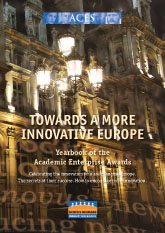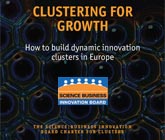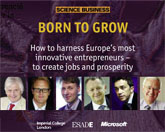9 July 2009
Policy | Innovation Economy
Regulating Knowledge
Debra M. Amidon

Debra M. Amidon, founder and CEO, Entovation International Ltd.
Flaws in our financial architecture have been exposed, our deepening interdependence magnified and the imperative for action obvious. Changing times and technologies demand a fundamental (re)thinking of how we participate and interact in our global networked society. At stake is how humankind develops its full potential, enterprises are cultivated and nations prosper without eyeing the resources of their neighbours.
Sign the Science|Business call for a Bretton Woods of Innovation
It’s time for a Bretton Woods-style meeting of innovation policy, says a
declaration signed by the Science|Business Innovation Board at a conference in
Brussels. Read and sign the declaration here.
In this century, progress must be for all – the common good – not the few. We have reached the law of diminishing returns of global competitiveness. Instead, it is necessary to strengthen and increase our innovation capability, and address disparate needs, while preserving our cultural heritage in a new era of ‘collaborative advantage’.
Since the 1944 Bretton Woods agreements, inadequacies in the global financial system have become magnified – each more widespread than the last and impacting the middle and under classes. The relation between business, government and the global citizenry needs redefinition; but how?
Let us consider:
-
A global knowledge commonwealth is replacing the world of nations and blurring geographic boundaries.
-
Our future is increasingly dependent upon the knowledge and success of others.
-
Knowledge is valuable; and innovation is the fundamental platform for progress.
-
Knowledge creates an economy based upon abundance, not material scarcity. Intangible knowledge assets are more valuable than tangible assets and require new indicators of performance.
-
To thrive amidst a chaotic, complex and unpredictable knowledge economy, people need to be inspired to action of good intent.
Technology and social media has driven a coalescing of resources – human, physical and financial – for mutual benefit. These factors are becoming increasingly knowledge-driven. They provide a foundation for unprecedented global innovation in what are communities of shared interest and goals, or zones of knowledge activity.
Economic communities have emerged under a variety of labels: Digital Villages, Creative Cities, Science Hubs, Regions of the Future, High Tech Corridors, Smart Islands, Innovation Nations, and Knowledge Clusters. At their core are collective investments of billions of dollars and an economic agenda fuelled by a shared desire to exploit knowledge and creative intellect as the engine to drive economic performance. All can be defined as Knowledge Innovation Zones and there are ways to measure their economic impact. In short, intellectual capital is now integrally linked to economic development.
In 1944 Bretton Woods provided a new system of monetary management with rules for commercial and financial relations. We now need a broadened set of principles and standards which take into account the increasingly important intangible variables which underpin today’s economic performance. These variables have complex inter-locking dimensions – better understood by viewing through three lenses – a triangulation of the Knowledge-based Economy, Society and Infrastructure. This Triple Knowledge Lens facilitates a new common language and shared vision for progress and sustainability.
Various economists have written widely on the concepts of knowledge production, entrepreneurship and the economics of knowledge. Regardless of the label, we need more comprehensive measures to calibrate this unprecedented kaleidoscopic change.
What else might we expect from a Bretton Woods of the Knowledge Economy?
-
International dialogue about the new interdependent world order emerging in our networked global economy, based upon knowledge flow, innovation systems, and international collaboration.
-
A Knowledge Innovation Mesh where all communities of common interest – geographic, industry and virtual - can participate in creating a ‘world trade of ideas’.
-
A World Collaboration Index – incorporating the best of intangible and tangible performance indices, however imperfect – to monitor the impact of building upon the strengths of one another.
With the G8 expanded to the G20, the discussion of a new world order is underway. French President Nicolas Sarkozy and British Prime Minister Gordon Brown called for a “New Bretton Woods” agreement in October 2008. Jean Dermine, INSEAD Professor of Banking and Finance called for a new international financial order. The World Bank has issued its World Knowledge Development Reports. The UN released major reports on Knowledge Societies.
Earlier this year, the Intellectual Assets Centre (UK) hosted the International Forum for Knowledge Asset Dynamics, while the Netherlands hosted the European Conference on Intellectual Capital. Research on this topic and resulting comparative indices have reached a level of maturity that deserves attention.
My fear is not that this event will not happen; it will. I worry that the visionaries who have pushed the frontiers of financial measurement to include the variables of intangible wealth and intellectual capital may not have a prominent seat at the table.
One thing is certain – our journey is underway and unstoppable. With conviction, overarching principles and consensus, we can smooth the path toward the peace and prosperity that drove the original Bretton Woods agreements.
Debra M. Amidon is founder and CEO, Entovation International Ltd., and author of The Innovation SuperHighway.













